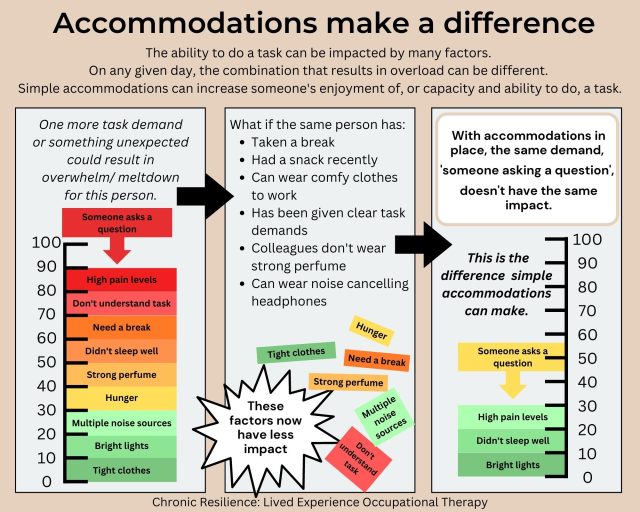Because Every Day is Not the Same

Many neurodivergent people have skills that fluctuate from day to day.
This comes up *so often* in IEP meetings that I’m sitting in. People will say of the child in their class, or of the child that they’re the parent of: “I know he knows how to X, because he X sometimes but not other times.” They will then continue: “So I know that when he doesn’t X, it’s because he’s choosing not to.”
I’m here to tell you that the first sentence can be true, but the second sentence does not inherently follow the first.
“I know he/she/they know how to X, because they X sometimes.” Yes.
“So therefore, when they don’t X, it’s because they’re choosing not to.” No. Not necessarily.
I could write paragraphs of information explaining this, but I feel like this visual image gives a better description than I could try to convey verbally.

Someone may be at 10% overwhelmed one day when you ask them to do X, and at 90% overwhelmed on another day when you ask them to do X. Maybe they need a little help with X on those days, or maybe they need the expectation to be dropped, or maybe they need you to do it for them—there can be lots of ways to deal with that overwhelm.
But I know it’s really tempting, even for people who do believe that kids want to do their best, to assume that having done it before means that they can do it again and do it always and do it under every circumstance. And it just doesn’t mean that. Maybe sensory factors are at play today that weren’t yesterday. Maybe there is fatigue or another interoceptive problem: they’re tired, they’re hungry, they’re thirsty, they need to toilet. Maybe there have been difficult or simply taxing social interactions today. Maybe they’ve already used all the executive functioning skills for the day that they had available. People do not have infinite resources.
That’s not because the person is choosing to be obstinate or choosing at all. It’s just because every day is not exactly the same.









